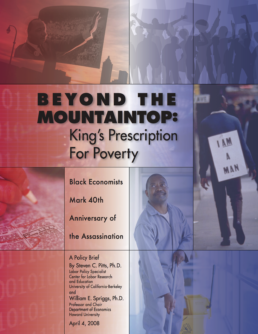When Dr. King spoke of his dream, he expressed hope that “we will be able to hew out of the mountain of despair a stone of hope.”
Yet his vision of workers’ rights as the next phase of the civil rights struggle, a fundamental message frame of Dr. King’s legacy, has yet to be fully articulated or realized.
McKinney & Associates was engaged by the UC Berkeley Center for Labor Research and Education to lead the strategic communications planning and rollout of a policy brief produced by labor specialist Dr. Steven C. Pitts and his colleague Dr. William E. Spriggs, chair of the Howard University Department of Economics. Entitled Beyond the Mountaintop: King’s Prescription for Poverty, the brief marked the 40th anniversary of Dr. King’s assassination. The document and attending public activities were to underscore his vision of workers’ rights.
Our involvement in the project began in October 2007 when Dr. Pitts, a renowned expert on low-wage workers, engaged the firm to provide strategic counsel and manage the development and execution of the multi-tier communications strategy.
Operating within a narrow window of time for execution, we shepherded a process of tactical planning, message development, report design, develop- ment and production, media outreach, data- base development, and report distribution.
McKinney played a major role in transforming the policy brief from a conceptual framework into a tangible, bound work of intellectual leadership by two noted, progressive economists. Our team planned and managed all aspects of the report production, including creative development, editorial services and distribution. We also provided editorial support in drafting the “Black Economists’ Statement.” Signed by 14 Black economists recruited by Dr. Spriggs, the statement urged policy action on the two-dimensional job crises of unemploy- ment and low-wage jobs.
The collaborative enterprise culminated in the release of the report at a news conference on April 2, 2008, which was captured on YouTube and traveled into online venues through a viral campaign. We paired new media with traditional pitching, op-ed placements in the Baltimore Sun and Philadelphia Inquirer, and distribution of the policy brief to key opinion leader venues—including The Washington Post, which excerpted data from the report. Team McKinney garnered additional mileage for the brief as other policy experts referenced, posted and distributed it through their networks and websites.

